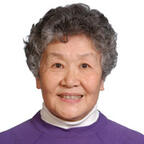
In 1957, encouraged by Premier Chou Enlai, who knew her parents (Wellesley alumna and author Bing Xin and professor Wu Wenzau), Wu Qing studied at the Beijing Foreign Languages Institute (later Beijing Foreign Studies University). An excellent student, Wu also set up a tile-making operation in response to Mao’s call for students to start factories. She joined other young people in tree-planting expeditions to the mountains, which first exposed her to rural life.
Wu began teaching English at the Institute in 1960, and also introduced women’s studies courses and taught American studies before retiring from Beijing Foreign Studies University in 2000. She also became well-known and popular as a television teacher of English in the late 1970s.
In 1984 Wu was first elected a people’s deputy in the Haidan District People’s Congress. Even as she continued teaching and winning teaching awards and honors, she developed a reputation as a fearless legislator and human rights activist. She was the first deputy to meet with constituents on a weekly basis and to report her work, relying heavily on the Chinese Constitution. She was a pioneer in advocating for Chinese women's educational and political participation at the grassroots level. Wu has been reelected six times as a people’s deputy for the Haidan District People’s Congress, and was also elected to the Beijing Municipal People’s Congress.
Since 1989, she has worked with the Canadian International Development Agency, working with women in poor and remote areas on literacy, microcredit, and legal training projects. Wu Qing founded the Rural Women Training School in Beijing to teach literacy and job skills to women and girls from the countryside.
Over the last 20 years, she helped prepare for and facilitate the Fourth World Conference on Women in 1994–1995, and served on the boards of the Beijing Cultural Development Center for Rural Women; the Global Fund for Women based in San Francisco; and Gender Action based in Washington, D.C. She has been president of the Women’s World Summit Foundation based in Geneva; honorary chair of the Women Interchange Network based in San Francisco; and jury member of the United Nations Educational, Scientific, and Cultural Organization (Unesco) International Award on Peace Education.
Wu Qing has received international recognition and many professional and public service awards. In 2001 she won "Asia's Nobel Prize," the Ramon Magsaysay Award for Public Service, becoming the first Chinese woman to do so. She has also been named an “Outstanding Individual of 2007” by the Changping District Education Committee, and a “Top Cover Personality” by the Chinese Senior Citizens’ magazine; and was nominated by the Schwab Foundation Network as one of the World’s Outstanding Social Entrepreneurs of 2003.
An extended biography of Wu Qing from 2001 can be found on the Ramon Magsaysay Award website.

